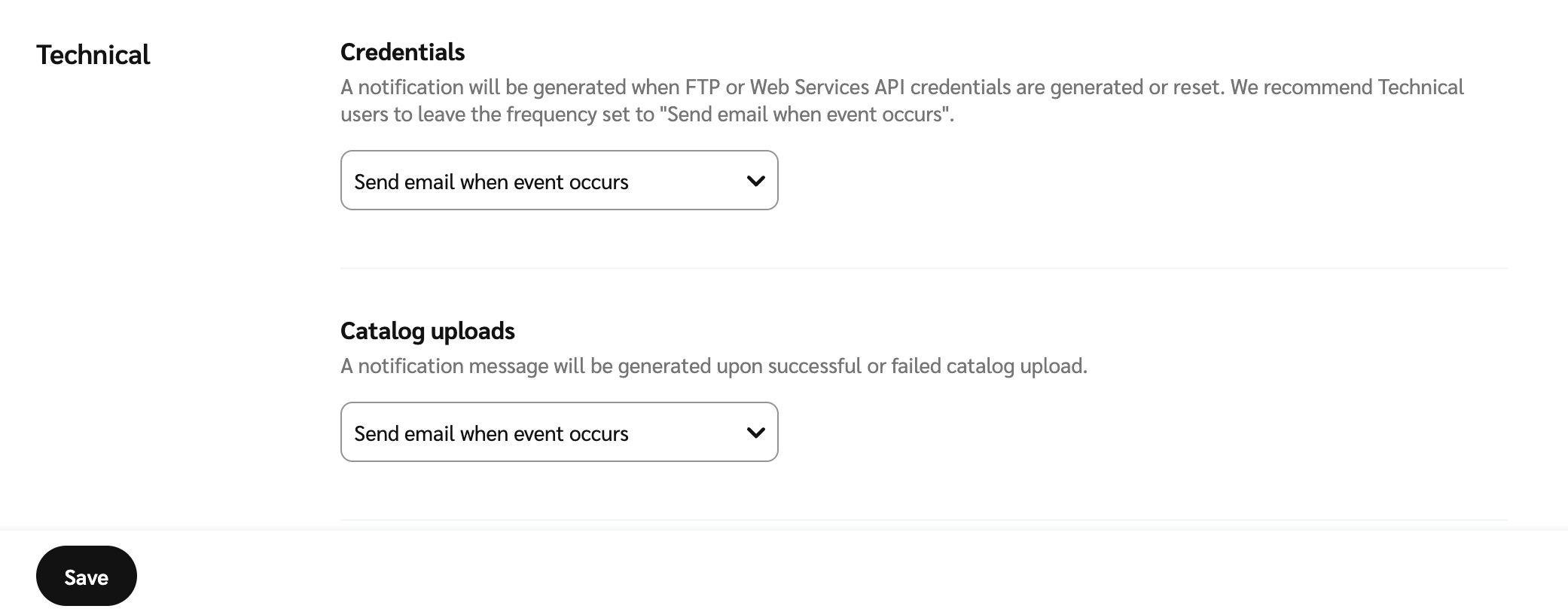A product catalog is a data file that provides detailed information about the products on your site. Product feeds are useful for a variety of use cases, such as building out comparison shopping engines or product storefronts.
In the left navigation bar, select
Engage → Content → Products → Product Catalogs.
In the upper-right corner, select Create Product Catalog Asset → Credit Card.
Fill in the fields as described in the Catalog field reference below.
Field
Description
Product Catalog Name
Enter a name for your catalog. This will be visible to partners so that they can identify the catalog. If you have multiple catalogs, they should have unique names.
Labels
Optionally, use labels to make the product catalog searchable by keyword for partners.
Catalog Instructions
Optionally, include a PDF file providing partners with additional catalog usage details. impact.com recommends including this step.
Upload Method
Choose 1of 3 methods to upload your catalog by selecting the
[Radio Button].
Larger catalogs can be uploaded to impact.com's FTP server. You'll receive login details and instructions once you create your first catalog with this method.
The credentials will be emailed to all account users with technical permissions. You can check your account permissions under
[User profile] → Settings → Account Users.
You can use these same credentials for uploading subsequent product catalogs.
Specify the URL location where impact.com can retrieve the product catalog.
For FTP, the URL should be of the FTP directory and the configured filename needs to match the name of the file on the FTP server.
The catalog is pulled periodically depending on the configured fetch frequency, which is set to Daily by default.
Service Areas
Use the fields and arrows to select Service Areas for geo-targeting.
Your Available areas are the service areas targeted by your program. You can change this in your program settings as follows:
From the left navigation menu, select
[User profile] → Settings.
In the left column, under General, select Manage Programs.
Select the the ID of the program for which you want to adjust Service Area settings.
Under Program Information, navigate to Service Areas.
Use the
[Drop-down menu] and
[Checked boxes] to select or deselect service areas as needed.
Once you're done, select Save.
Mobile App Fallback
Optionally,
[Toggle on] to reroute traffic elsewhere if users don't have your mobile app installed.
Access Product Catalog via API
Optionally, get API access so that you can maintain your product catalogs via API. This will enable you to query, create, update, and delete catalog items. See the API documentation for more info.
Restrict Partner Access
Optionally,
[Toggle on] to permit only specific partners to access the catalog. Use the fields and arrows to restrict access to particular partner groups, and use the search bar to search for individual partners to make the ad only available to them.
Partner Download Options
Optionally, deselect any methods that you don't want partners to use when downloading your catalog. All methods are permitted by default.
FTP
API
Partner Portal Browser Download
Select Save.
Upload your catalog.
Ensure that the file name and extension match the details you provided in the Upload Method field.
See the File extension guidelines reference for more information.
When using
.txtformat, always save the file inUTF-16encoding.When using
.csvformat, always save the file inUTF-8encoding.For
.aprxfields, if you prefer using your own text instead of impact.com's specified format, use the Description fields.To open a downloaded file in Microsoft Excel if it's not in
.xlsxformat, do the following to avoid encoding issues:
Example file
CatalogItemID,Name,URL,Description,Image URL,Category,Current Price,Balance Transfer APR,Regular APR
Select Done.
After creating and uploading your product catalog, impact.com processes the file for errors. Errors can affect the availability of your catalog to partners as detailed in the following scenarios:
Scenario | Possible reason |
|---|---|
Catalog not made accessible at all |
|
Full catalog made accessible |
Note: The catalog may still have minor issues like warnings or duplicates, which you can fix if you wish. |
Specific records excluded |
|
Error Message | Meaning |
|---|---|
No catalog found for the request. Check if the file name of uploaded file is the same as the one registered with the catalog | The uploaded file's name doesn't match the name you provided in the Upload Method field when creating the catalog. |
No attributes present in the catalog file | The catalog file is empty. |
Catalog item with ID occurs more than once in the catalog, and those after the first will be ignored | There are duplicate product IDs in the catalog. |
Record '1' has an error: (line 1) invalid char between encapsulated token and delimiter | Your delimited file contains invalid use of double quotes. Double quotes within a field's content must be replaced with 2 double quotes. E.g.: |
(startline 1) EOF reached before encapsulated token finished | Your delimited file contains an opening double quote and a new line prior to the closing of the quotes. |
Error parsing (catalog type) field: with value: (field) | The product field value cannot be accepted. |
Record (recordNumber) has an error: The number of delimited values (FieldsLength) does not match the expected (ColumnNamesLength) | The number of record fields does not match the number of column names in your delimited catalog. |
No valid records were found in the catalog file | Your catalog has no records. |
More than 10% of the records in the file had errors | More than 10% of records in your catalog records have errors and the file cannot be processed. |
To receive email notifications regarding product catalog upload failures, do the following:
From the top navigation bar, select
[Notifications] → Settings.
Under the Technical section, navigate to Catalog Uploads and select the notification cadence that suits you from the
[Drop-down menu].
Select Save.
